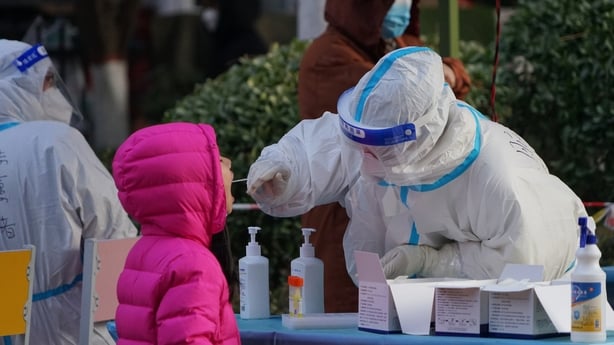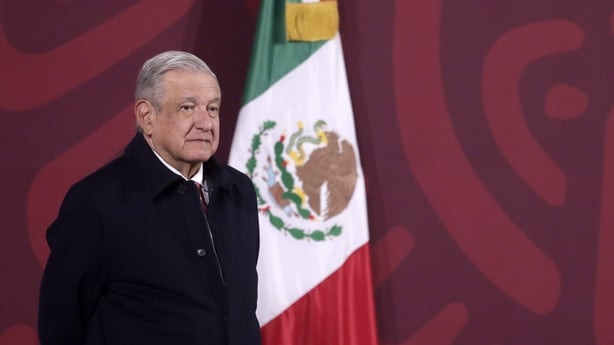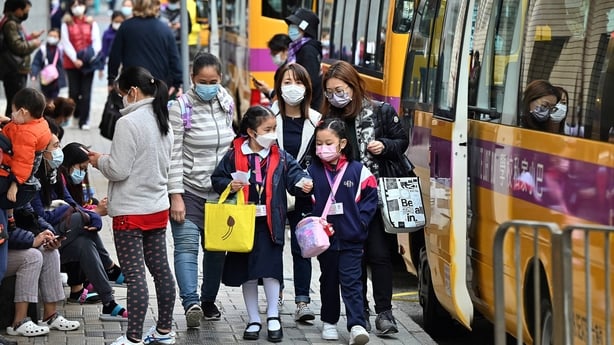Scotland will start lifting coronavirus measures that were introduced late last year, starting with the removal of limits on crowds at large outdoor events like football and rugby matches, Scottish First Minister Nicola Sturgeon has said.
In December, Scotland went further than British Prime Minister Boris Johnson did in England to slow the spread of the Omicron variant. This included Scotland imposing restrictions on venues and large events.
Ms Sturgeon said the public's behaviour and the booster programme had helped avert the worst-case projections given last month, when Scotland cancelled New Year's Eve celebrations.
"From next week, we will begin to lift the measures introduced before Christmas, but we will do so in a phased and careful way, starting with the removal of attendance limits on live outdoor events from Monday," Ms Sturgeon told parliament.
Ms Sturgeon also said that, while the situation was undoubtedly serious, the rate of increase in hospitalisations was starting to slow.
She also announced a change to the vaccine certification that is needed to get into some venues in Scotland.
Now it requires the booster dose rather than just the initial two-dose vaccination needed previously, if the second dose was more than 4 months ago, although a negative antigen test can also be used, Ms Sturgeon said.
France reports record cases
France has reported 368,149 new coronavirus cases, the highest single-day tally of the pandemic in the country.
The previous high of 332,252 was set on 5 January, since when France - where Omicron has become the dominant variant - has recorded two more days above 300,000.
The seven-day moving average of new cases rose to over 280,000 today.
By mid-January, the French government aims to introduce a vaccine pass that will make inoculation mandatory for anyone wanting to go to restaurants or attend indoor events.
Until now, proof of vaccination or a recent negative test have been sufficient.
Millions more locked down as China battles Omicron spread

Five million residents of a central Chinese city have started home confinement in a new lockdown to curb the spread of the highly transmissible Omicron variant of the coronavirus, according to state media.
Beijing is on high alert for new outbreaks as it prepares to host the Winter Olympics next month, sticking to a "zero-Covid" strategy of targeted lockdowns, border restrictions and lengthy quarantines.
While those measures have kept the number of new cases far lower than virus hotspots in the United States and Europe, Beijing is currently battling local flare-ups in multiple cities.
The fast-spreading Omicron strain presents a fresh challenge, with two cases in Anyang - the newly locked down city in Henan province - linked to a growing infection cluster in the northern metropolis of Tianjin, some 400km away.
Authorities in Anyang announced the lockdown last night, issuing a notice ordering residents not to leave their homes or drive cars on the roads, state news agency Xinhua reported.
All non-essential businesses have been closed and a mass-testing drive has been launched "to respond to the severe epidemic control situation and strictly prevent the spread of the Omicron virus outbreak", Xinhua reported.
There were 58 new local infections reported in Anyang, state broadcaster CCTV said today, bringing the city's total caseload to 84 since Saturday.
It was not immediately clear whether the new cases were tied to the Omicron variant.
The city had already restricted outbound travel, which local officials said was to "ensure that the outbreak does not spill over into outside areas".
At least three cities in Henan are battling emerging outbreaks, with provincial capital Zhengzhou closing schools and pre-schools, and stopping restaurants from accepting dine-in customers.
Last week, one million people in the city of Yuzhou were put under stay-at-home orders.
Elsewhere, Tianjin - a major port city just 150km from Beijing - has barred people from leaving without official permission, ordered the testing of all 14 million residents, and cancelled trains into the capital.
Tianjin is adjacent to Winter Olympics venues in Beijing and Hebei province and confirmed another 10 new locally transmitted cases after citywide mass testing.
The northern city of Xi'an is in its third week of lockdown as it attempts to stamp out a 2,000-case outbreak.
And after logging a handful of cases in recent days, Shenzhen - a southern tech hub just across the border from Hong Kong - has locked down some housing compounds, launched a mass-testing initiative and shuttered some long-distance bus stations.
Poland records 100,000 Covid-linked deaths
More than 100,000 people have died in Poland from Covid since the start of the pandemic, the government said, as the mortality rate in the country is among the highest in the world.
"It's another sad day but particularly so today because we have crossed the threshold of 100,000 deaths," Health Minister Adam Niedzielski told news channel TVN24.
Mr Niedzielski said the most recent daily data showed 493 people had died, which would bring the total toll to 100,254 deaths, and pointed out there were 18,000 people currently in hospital.
According to a tally compiled by AFP with the latest available data, Poland has reported 14.31 deaths per 100,000 inhabitants over the last 14 days - the sixth-highest level in the world after Trinidad and Tobago, Moldova, Georgia, Hungary and San Marino.
The level in neighbouring Germany is 4.31 in 26th place.
Only around 63% of Polish adults are fully vaccinated against Covid-19 - one of the lowest levels in the EU.
The government has encouraged Poles to get vaccinated but has been criticised by the opposition for not taking stronger action by for example introducing requirements for vaccine certificates.
The highest total of Covid-related deaths in the EU so far is in Italy at over 139,000, followed by France, Germany and Poland.
Mexican president says he has Covid for second time
Mexican President Andrés Manuel López Obrador has said that he had Covid-19 for a second time and was experiencing mild symptoms, as the hard-hit country battles another wave of infections.
"I inform you that I am infected with Covid-19 and although the symptoms are mild, I will remain in isolation and will only do office work and communicate virtually until I get through it," he tweeted.
Mr López Obrador said that Interior Minister Adan Augusto Lopez would replace him at his usual morning press conference and other public events while he recovered.
Hours earlier the 68-year-old president had appeared in front of journalists without a face mask speaking with a hoarse voice, prompting accusations from his critics of irresponsible behaviour.
He said he planned to get tested for Covid-19 but believed he had the flu.

Some social media users wished Mr López Obrador a speedy recovery, while others criticised him for being reckless.
"If he falls seriously ill, he will have the best doctors at his service," political analyst Viri Rios said in a Twitter post that was shared hundreds of times. "Many journalists in the audience, however, do not even have (health) insurance."
Mr López Obrador overcame a first bout of Covid-19 in early 2021.
He has received the AstraZeneca vaccine including a booster on 7 December.
Like many countries, Mexico is in the grip of a new wave of coronavirus infections following the emergence of the highly contagious Omicron variant and traditional year-end family gatherings.
On Friday, Mexico's official Covid-19 death toll - the fifth highest in the world - surpassed 300,000, although daily fatalities remain far lower than during previous waves.
The country of 129 million people has reported a total of more than 4.1 million confirmed cases of the coronavirus.
The real figure is believed to be much higher due to the low level of testing.
One of the world's most popular tourist destinations, Mexico has kept its borders open during the pandemic and does not require any tests or vaccination passes from arriving travelers.
Hong Kong unveils further steps to curb Covid-19 spread, boost vaccinations
Hong Kong will shut pre-schools and primary schools and start offering Covid-19 vaccines for children from the age of five, the city's leader said, as the financial hub grapples with an increase in coronavirus infections.
Certain passengers meanwhile will be banned from transiting through Hong Kong for a month, Bloomberg News reported, citing unnamed people familiar with the matter.
It comes as the Chinese-ruled city has seen some local transmissions of the Omicron coronavirus variant after three months of no local coronavirus cases at the end of last year.
Chief Executive Carrie Lam told reporters in a weekly media briefing that pre-schools and primary schools must stop face-to-face classes from Friday until after the Lunar New Year at the beginning of February to prevent transmissions of the fast-spreading Omicron variant.

Schools had mostly resumed in-person classes late last year after months of online teaching.
Children over five will be able to get the Chinese-made Sinovac vaccine, Ms Lam said. Authorities have cleared the other vaccine available in Hong Kong, made by Germany's BioNTech, for children aged 12 and older.
Separately, Bloomberg News said Hong Kong's international airport was set to ban transit by passengers from 150 designated high-risk places from 15 January to 14 February, citing the unnamed sources.
The ban will not apply to diplomats, government officials, athletes and staff participating in the Winter Olympics, which open on 4 February in Beijing, according to the report.
Hong Kong had already banned passenger flights from Australia, Canada, France, India, the Philippines, Pakistan, Britain and the United States in early January.

